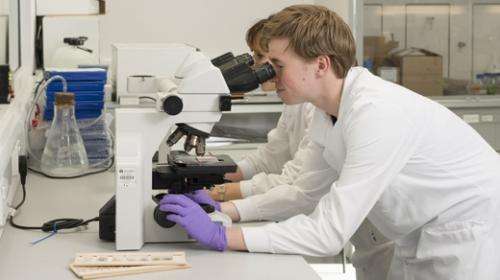Researchers transmit Parkinson disease variant from humans to mice

New research using tissue from the Parkinson's UK Brain Bank suggests that a protein called alpha-synuclein causes the spread of nerve cell death in multiple system atrophy (MSA), a Parkinson's-like condition.
Researchers injected a misshapen human version of the protein into the brains of healthy mice and saw the symptoms of MSA develop and slowly worsen.
These new findings are published in the scientific journal PNAS.
This follows on from a study last year that showed very similar results for Parkinson's.
What is multiple system atrophy?
Multiple system atrophy (MSA) is a progressive neurological disorder that affects around 3,000 people in the UK.
It's caused by the death of nerve cells in the brain which can result in problems with movement, balance and automatic functions of the body such as bladder and blood pressure control.
MSA is a form of parkinsonism - an umbrella term that describes many conditions which share some of the symptoms of Parkinson's.
In the early stages, people with MSA can sometimes be wrongly misdiagnosed with Parkinson's.
And, like Parkinson's, sticky clumps of misshapen alpha-synuclein protein are found in the brains of people with MSA.
What this study found
First, the researchers took misshapen alpha-synuclein from brain tissue donated to the Parkinson's UK Brain Bank by people who had lived with MSA.
Next, the team injected the protein into the brains of healthy mice.
The researchers began to notice changes in the behaviour of the mice around 90 days after the injection.
And when they looked inside their brains they found that the misshapen alpha-synuclein protein had spread through many areas and caused nerve cell death.
Important insights into a complex condition
Claire Bale, our research communications manager, comments:
"Multiple system atrophy is a very complex condition and at the moment the treatments available to people living with it are limited.
"This study offers hope that developing treatments that can stop the spread of alpha-synuclein could have huge potential for treating both Parkinson's and multiple system atrophy.
"It also provides a new animal model that can be used to study how the condition develops over time, and for testing new treatments.
"Finally, this study also demonstrates the vital role that human brain tissue plays in Parkinson's and MSA research. We simply couldn't understand these conditions without it."
- See more at: brain-bank-tissue-helps-unravel-secrets-msa#sthash.MOuHCs9r.dpuf" target="_blank">www.parkinsons.org.uk/news/11- … sthash.MOuHCs9r.dpuf
More information: "Transmission of multiple system atrophy prions to transgenic mice," by Joel C. Watts et al. www.pnas.org/cgi/doi/10.1073/pnas.1318268110
















